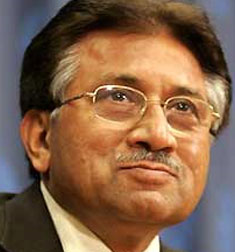By Hanan Habibzai,STAFF WRITER
General Parviz Musharaf , who led Pakistan into a war, backed US-led occupation of Afghanistan in 2001 , and attacked the Red Mosque on July 2007 which took him to an uncertain battle against his own people.
Therefore, he faced the serious anger of his fellow countrymen but despite widespread displeasure he announced a new party All Pakistan Muslim League the APML, earlier October.
‘’I’d like to come to the politics in democratic dispensation of Pakistan.’’ The former Pakistani ruler said during an exclusive interview with RFERL.
In October 1999, Musharaf comes up with a military coup against Nawaz Sharif and seizes the power. He was long regarded as a military dictator who ended a democratic regime.

Soon after the 9/11, he becomes a close ally of the west when he slashes links with the Taliban. He was forced out from the country after a political deal with the newly elected government two years ago.
The ousted ruler of Pakistan says, he committed indefinite mistakes in power but rushed on Zardari’s government saying ‘’ the leadership continuously failed to harness all the resources for the betterment of Pakistan. Unfortunately we are going down.’’
He served years in military until his last job, the commander of the world’s second largest Muslim state’s land-based armed force which brought him to a controversial stage of Pakistani politics.
Musharaf was born in Delhi, in August 1943 to Muslim parents. After the partition of the Indian sub-continent into the present day India and Pakistan in 1947, his family migrated to Karachi, Pakistan’s largest city.
He spent most of his life in military uniform, now in civilian dress, vigorously blames India of ‘’trying to create anti-Pakistan Afghanistan.’’
General Musharaf criticized India’s role in Afghanistan and called on Delhi to cool down in Kabul.He believes that India is investing on Afghan war to use the intermingled situation and geographical position of the war torn country against Pakistan.
‘’If we were to collaborate against the terrorism and extremism then we need a respective behaviour in a political manner. If we were squabble between ourselves and fight each other and trying to stab each other at the back in Afghanistan and any other country, which would be very sad day, sad for the region sad for both the countries. ‘’
He was speaking on behave of his new political party insuring the world; he is ready to stand against the Taliban in Pakistan.
‘’We do not want Talibanization of Pakistan said Musharaf. I never called them strategic partners or anything. We were in the side of the Taliban against the Northern Alliance because Northern Alliance was aided by India and Russia.’’
General Musharaf wanted to manifest his new political strategies in order to chart a stable government in Afghanistan. Former military commander and ousted ruler of Pakistan thinks, the majority of Afghan Population was ignored by United States and the western allies.
‘’ Taliban were all Pashtun who had ethnical and geographical link with Pashtuns in Pakistan side, therefore we were on their side. After the 9/11 I called it the third blender, the biggest blender that we didn’t change strategy. Their command structure totally smashed and disorganised. We can easily take Pashtuns on board; give them their legitimate position of governance in Afghanistan. We have to deal with the Pashtuns in Afghanistan. We didn’t do that.’’ He added.
Despite his ties with the Taliban regime Musharaf agreed to join the Bush administration’s “war on terror” following the Sept. 11, 2001 attacks. He took the step for some obvious reasons. Between 2001 and 2007, the United States funnelled more than $12 billion in aid to Musharaf’s regime, most of it to military. He also received cash price of each suspected Al-Qaida or Taliban member handed over to the US but still does not change his mind.
‘’ They are coming in to Pakistan; they have support in Pakistan there are Taliban in the mountains of Pakistan. But the main force and the concentration of Taliban are in Afghanistan and this is what the misperception is being created. If you win in Afghanistan, you also win in Pakistan. You win in Pakistan, I don’t think you win in Afghanistan.’’
General Parviz Musharaf is hoping a return to Pakistan in order to play a new rule in the future of his country. Most of his party members belong to Pakistani community in the UK who do not have much influence in Pakistan.

Hanan Habibzai, an investigative journalist with more than ten years of experience in global journalism has covered the US invasion of Afghanistan, the fall of the Taliban regime, and post-Taliban developments, including the rise of militancy in the country.
MA in global journalism from Coventry University, Hanan writes on the conflict in Afghanistan and the regional politics, his work has been published by the BBC Afghan Stream, Pajhwok Afghan News, Reuter’s news agency, the Washington Post, Veterans Today, several local and the global media agencies, Including contribution in a journalism book Afghanistan War and the Media: Deadline and Frontline (2010), edited by R, Keeble & J, Mair, Hanan’s academic work is published around the world.
ATTENTION READERS
We See The World From All Sides and Want YOU To Be Fully InformedIn fact, intentional disinformation is a disgraceful scourge in media today. So to assuage any possible errant incorrect information posted herein, we strongly encourage you to seek corroboration from other non-VT sources before forming an educated opinion.
About VT - Policies & Disclosures - Comment Policy



